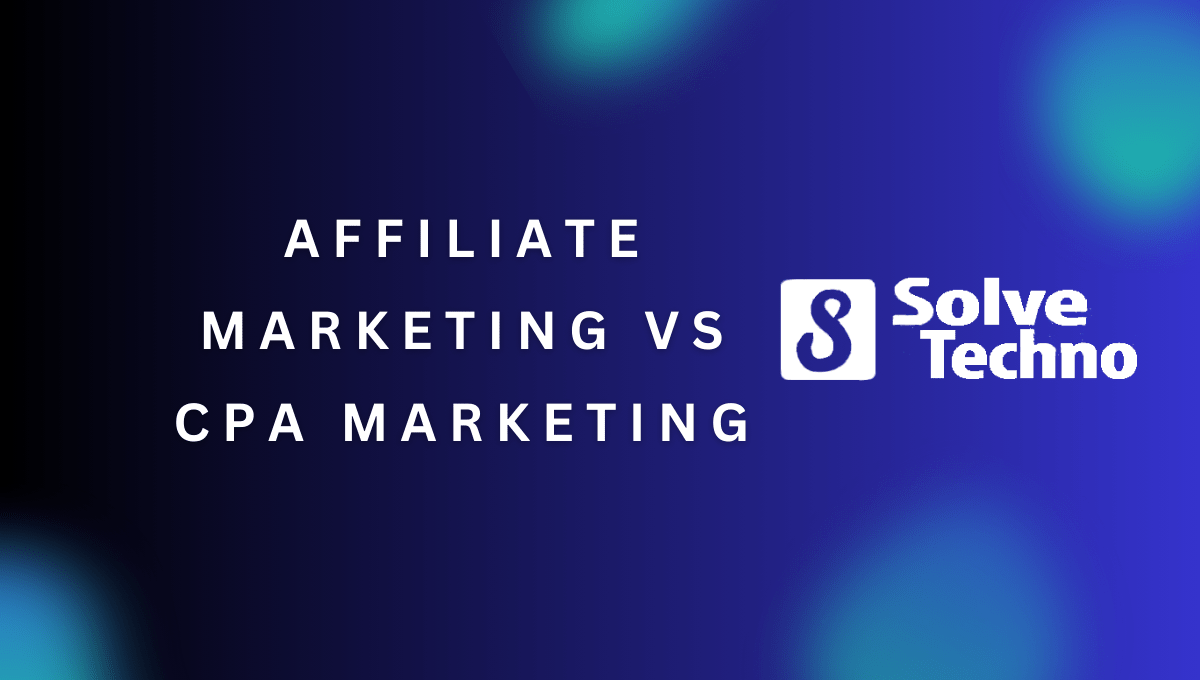Affiliate marketing vs CPA marketing are two different approaches to online advertising and monetization. Affiliate marketing involves promoting products or services and earning a commission for each sale or conversion, while CPA marketing focuses on earning a commission for a specific action, such as getting users to sign up for a newsletter or fill out a form.
In the digital era, online advertising and monetization have become crucial for businesses seeking to expand their reach and generate revenue. Affiliate marketing and CPA marketing are two popular strategies employed by marketers to achieve these goals. Affiliate marketing involves promoting products or services offered by other businesses and earning a commission for each sale or conversion that occurs through one’s promotional efforts.
This strategy often involves joining an affiliate program, where marketers are provided with unique tracking links or codes to track their referrals and receive credit for any resulting conversions. On the other hand, CPA marketing, which stands for Cost Per Action or Cost Per Acquisition, focuses on earning a commission for a specific action rather than a sale. This could be as simple as getting users to sign up for a newsletter, fill out a form, or download an app. Marketers earn a commission for each successful action, making it a highly measurable and performance-based form of advertising. Both affiliate marketing and CPA marketing offer unique advantages and considerations. The success of each strategy depends on various factors such as the products or services being promoted, the target audience, and the marketer’s ability to effectively engage and convert users. Ultimately, businesses must carefully consider their goals, resources, and audience when deciding which approach to adopt.
Table of Contents
What Is Affiliate Marketing?
Affiliate marketing and CPA marketing are two commonly used strategies for online advertising. While affiliate marketing focuses on promoting products and earning a commission for each sale, CPA (Cost Per Action) marketing aims to generate leads or specific actions on a website.
Both methods have their advantages and can be effective depending on the goals of a campaign.
Affiliate Marketing Vs CPA Marketing:
Affiliate marketing is a highly popular and effective method of earning income online. It involves promoting products or services on behalf of a company and earning a commission for every successful referral or sale that is made through your promotional efforts.
In this section, we will explore the definition, basic concept, how it works, and the pros and cons of affiliate marketing.
Definition And Basic Concept:
- Affiliate marketing is a performance-based marketing strategy where individuals or entities (affiliates) promote products or services of companies to earn a commission.
- Affiliates utilize various channels such as websites, blogs, social media, or email marketing to reach potential customers and drive sales.
- Commission rates can vary, and affiliates are typically paid on a per-sale, per-lead, or per-click basis, depending on the agreed-upon terms.
How Does It Work?
Affiliate marketing operates on a simple principle: affiliates are given unique tracking links or codes to promote the products or services of companies. When a customer clicks on these links and makes a purchase or performs a desired action, the affiliate is credited for the referral and receives a commission.
Here’s how the process generally works:
- Affiliate signs up: Affiliates join affiliate programs of companies they wish to promote.
- Choose products or services: Affiliates select specific products or services they believe will resonate with their audience.
- Promote affiliate links: Affiliates incorporate their unique affiliate links in their marketing channels, sharing them with their audience through blog posts, social media, or email campaigns.
- Tracking: When a customer clicks an affiliate link, a tracking cookie is placed on their device to identify the affiliate responsible for the referral.
- Conversion: If the customer completes a purchase or performs the desired action (such as filling out a form), the affiliate is credited with the referral and earns a commission.
- Commission payment: Usually on a monthly basis, the affiliate receives payment for their successful referrals.
Pros And Cons Of Affiliate Marketing:
Pros:
- Flexibility: Affiliate marketing allows individuals to work on their own terms and choose products or services aligned with their interests and target audience.
- Low start-up costs: There are typically no costs associated with joining affiliate programs, making it an affordable option for anyone to get started.
- Passive income potential: Once set up, affiliate marketing can generate passive income as long as the affiliated content remains accessible and relevant.
- Diverse income streams: Affiliates can promote multiple products or services across various niches, diversifying their income potential.
Cons:
- Dependence on others’ products: Affiliates rely on the quality, reliability, and reputation of the products or services they promote, which are out of their control.
- High competition: As affiliate marketing continues to grow in popularity, competition among affiliates can be intense, requiring dedicated effort to stand out.
- Commission structure: Some affiliate programs may offer low commission rates, limiting earnings potential for affiliates.
- Affiliate link lifespan: Tracking cookies may expire after a certain period, leading to missed commission opportunities if customers delay their purchases.
Affiliate marketing offers a flexible and potentially lucrative opportunity to earn income online. By leveraging their online presence and choosing the right affiliate programs, individuals can capitalize on their digital influence and earn commissions for successfully driving sales or referrals.
What Is CPA Marketing?
CPA marketing, also known as Cost Per Action marketing, is a type of affiliate marketing where you earn a commission by getting people to take a specific action, such as signing up for a newsletter or completing a form. It offers a more targeted approach compared to traditional affiliate marketing, as you only get paid when someone completes the desired action.
Affiliate Marketing Vs CPA Marketing:
Are you curious about CPA marketing and how it compares to affiliate marketing? In this section, we’ll explore the basics of CPA marketing, giving you a clear understanding of what it is and how it works. Let’s dive in!
Definition And Basic Concept:
- CPA stands for Cost Per Acquisition or Cost Per Action. It is a performance-based marketing model where advertisers pay affiliates for a specific action or conversion.
- The goal of CPA marketing is to drive desired actions, such as signing up for a newsletter, making a purchase, submitting a lead form, or downloading an app.
- Unlike affiliate marketing, where affiliates are typically paid a commission on each sale they generate, CPA marketing focuses on specific actions beyond just making a sale.
How Does It Work?
- Advertisers create CPA marketing campaigns and specify the desired actions they want users to take.
- Affiliates join CPA networks and choose the offers they want to promote.
- Affiliates promote the offers through various channels, such as website banners, email marketing, social media, or search engine advertising.
- When a user performs the desired action, such as making a purchase or submitting a lead form, the affiliate is credited with this conversion.
- The affiliate receives a predetermined commission for each successful action, which is typically higher compared to traditional affiliate marketing commissions.
Pros And Cons Of CPA Marketing:
Pros:
- Higher earnings potential: CPA offers often have higher commission rates, providing affiliates the opportunity to earn more for each conversion.
- Diverse range of actions: Unlike affiliate marketing, with CPA, affiliates can promote a wider range of actions beyond just sales, increasing their potential to earn.
- Performance-based: CPA marketing is based on performance, meaning affiliates are rewarded specifically for successful actions, giving them more control over their earning potential.
Cons:
- Stricter approval process: CPA networks often have strict approval processes and require affiliates to meet certain criteria to promote particular offers.
- Higher competition: As CPA offers tend to offer higher commission rates, they attract more affiliates, resulting in increased competition for promoting those offers.
- Requirement for targeted traffic: To achieve successful conversions, affiliates must drive targeted traffic to CPA offers, which may require additional effort in terms of marketing strategies.
CPA marketing offers a unique approach in the world of affiliate marketing, focusing on specific actions and rewarding affiliates based on successful conversions beyond sales. While it offers higher earning potential and a diverse range of actions to promote, it also comes with stricter approval processes and increased competition.
Consider your strengths and goals when deciding between affiliate marketing and CPA marketing to find the best fit for your marketing efforts.
Remember, success in CPA marketing depends on understanding your target audience, leveraging various marketing channels, and staying up-to-date with industry trends.
Affiliate Marketing Vs CPA Marketing: Comparison of Earning Potential
Affiliate marketing and CPA marketing are two different approaches to earning potential online. While affiliate marketing involves promoting products and earning commissions, CPA marketing focuses on generating leads and earning money for each action taken by a user. Understanding the distinctions between these two strategies is crucial for maximizing your earning potential in the digital space.
Affiliate marketing and CPA marketing are two popular methods of earning money online. While both involve promoting products or services for a commission, the earning potential can vary significantly. Let’s take a closer look at the earning potential in each of these marketing models and explore the factors that affect it.
Earning Potential In Affiliate Marketing:
Affiliate marketing offers a great opportunity to generate passive income by promoting products or services and earning a commission for each sale. Here are some key points to understand about the earning potential in affiliate marketing:
- Commission Structure: Affiliate marketers earn a percentage of the sale price for each successful referral. This means the more sales they generate, the more they earn. Commission rates can range from as low as 5% to as high as 50%, depending on the affiliate program.
- Product Price: The price of the products or services being promoted is another important factor. Higher-priced products generally offer higher commissions, resulting in greater earning potential per sale.
- Recurring Commissions: Some affiliate programs offer recurring commissions, which means the affiliate continues to earn commissions for as long as the referred customer remains active. This can significantly boost earning potential over time.
- Niche Selection: The choice of niche can also impact earning potential. Niches with high consumer demand and relatively low competition tend to offer better opportunities for affiliates to generate sales and earn higher commissions.
- Marketing Strategies: The effectiveness of marketing strategies used by an affiliate marketer can greatly impact their earning potential. Those who are skilled in driving targeted traffic, optimizing landing pages, and utilizing various marketing channels, such as SEO and social media, are more likely to succeed and earn higher commissions.
Earning Potential In Cpa Marketing:
CPA (Cost Per Action) marketing is another popular form of online marketing, where affiliates earn a commission for specific actions taken by the referred customers, such as submitting an email address, completing a form, or downloading an app. Here’s what you need to know about the earning potential in CPA marketing:
- Conversion Offers: CPA marketing typically offers a fixed rate commission for each action completed by the referred customer. The commission rates can range from a few cents to several dollars, depending on the complexity of the action required.
- Offer Quality: The quality of the CPA offers being promoted plays a significant role in earning potential. High-converting offers with attractive incentives and clear calls-to-action are more likely to generate conversions and higher earnings.
- Traffic Quality: Driving targeted traffic is crucial in CPA marketing. Affiliates need to attract visitors who are likely to take the desired action on the offer page. The quality of traffic, in terms of relevance and engagement, directly impacts the earning potential.
- Conversion Rates: The ability to effectively optimize campaigns and improve conversion rates is key to maximizing earnings in CPA marketing. Affiliates who can optimize landing pages, ad copy, and targeting methods to improve conversion rates have a higher earning potential.
- Campaign Scale: Scaling CPA campaigns can lead to higher earnings. Affiliates who can successfully optimize and scale their campaigns to reach larger audiences while maintaining positive ROI are more likely to achieve greater earning potential.
Both affiliate marketing and CPA marketing offer opportunities for individuals to earn money online. The earning potential in both models is influenced by various factors such as commission structure, product price, niche selection, marketing strategies, and the quality of offers and traffic.
By understanding these factors and implementing effective strategies, individuals can maximize their earning potential in either affiliate marketing or CPA marketing.
Affiliate Marketing Vs CPA Marketing: Comparison of Control and Flexibility
Affiliate Marketing offers greater control and flexibility compared to CPA Marketing, allowing marketers to select and promote products they believe in. With affiliate marketing, marketers have the freedom to choose their promotional strategies and campaigns based on their target audience.
This level of control enables them to build strong relationships and maximize their earnings potential.
Affiliate marketing and CPA marketing are both popular strategies for generating income online. While they have some similarities, there are distinct differences when it comes to control and flexibility. In this section, we will compare the level of control and flexibility in each marketing method to help you make an informed decision.
Level Of Control In Affiliate Marketing
• Affiliates have the freedom to choose which products or services they promote.
• Affiliates can decide how they promote the products, whether it’s through blog posts, social media, or email marketing.
• Affiliates have control over the content they create, allowing them to tailor it to their target audience.
• Affiliates can experiment with different marketing strategies and adjust accordingly to optimize their results.
• While affiliates have control over their own promotional efforts, they have limited control over the actual product or service being promoted.
Level Of Control In CPA Marketing
• CPA marketers have more control over the advertising and promotion of the products or services they are promoting.
• CPA marketers can choose specific campaigns to promote, giving them control over the offers they want to focus on.
• CPA marketers have more control over the landing pages and funnels they use to convert visitors into leads or customers.
• CPA marketers can test and optimize different elements of their campaigns to improve their conversion rates.
• Unlike affiliates, CPA marketers have less control over the actual product or service being promoted, as they are typically working with a network or advertiser.
Flexibility And Scalability In Affiliate Marketing
• Affiliate marketing offers flexibility in terms of the products or services you promote, allowing you to choose offers that align with your interests and target audience.
• As an affiliate, you have the flexibility to work from anywhere and at any time, as long as you have an internet connection.
• Affiliate marketing is highly scalable, as you can promote multiple products or services simultaneously and earn commissions from each of them.
• With affiliate marketing, you have the flexibility to diversify your income streams by promoting products or services from different niches or industries.
Flexibility And Scalability In CPA Marketing
• CPA marketing offers flexibility in terms of the campaigns you choose to run, allowing you to focus on specific offers that yield the best results.
• Like affiliate marketing, CPA marketing allows you to work remotely and on your own schedule.
• CPA marketing is also scalable, as you can run multiple campaigns simultaneously and scale up your advertising efforts as you see positive results.
• With CPA marketing, you have the flexibility to explore different niches and industries to find the campaigns that are most profitable for you.
Both affiliate marketing and CPA marketing offer varying levels of control and flexibility. Affiliates have more control over their promotional efforts and content creation, while CPA marketers have more control over the advertising and campaigns they run. Both methods offer flexibility and scalability, allowing you to customize your approach and expand your income potential.
It’s important to consider your own preferences and goals when deciding whether to pursue affiliate marketing or CPA marketing.
Affiliate Marketing Vs CPA Marketing: Comparison of Conversion Rates
Affiliate marketing and CPA marketing are two popular tactics to drive conversions. While affiliate marketing relies on promoting products or services to earn commissions, CPA marketing focuses on driving specific actions. Both approaches have different conversion rates, making it important to understand which one aligns better with your goals.
Affiliate marketing and CPA marketing are both popular methods of generating income online. While they have similarities, there are significant differences in their conversion rates. We will explore the factors that affect conversion rates in both affiliate marketing and CPA marketing, and discuss strategies to improve conversions in each.
Let’s dive in and examine these aspects closely.
Factors Affecting Conversion Rates In Affiliate Marketing:
- Quality of Traffic: The source of traffic plays a vital role in conversion rates. Targeted traffic that is genuinely interested in the affiliate product or service is more likely to convert. High-quality traffic can be obtained through SEO, content marketing, and social media promotion.
- Relevance of Offer: The alignment between the affiliate offer and the audience’s needs and interests greatly impacts conversions. Offering products or services that closely match the audience’s preferences increases the likelihood of conversion.
- Website Design and User Experience: A well-designed, user-friendly website can significantly improve conversion rates. Ensuring fast loading times, easy navigation, and clear call-to-actions can have a positive impact on conversions.
- Trust and Credibility: Building trust with the audience is crucial in affiliate marketing. Establishing credibility through testimonials, reviews, and transparent disclosure of affiliate relationships can instill confidence and boost conversions.
- Content Quality: Compelling and informative content that educates, entertains, or solves a problem can be a powerful driver of conversions. Providing value to the audience through high-quality content increases their trust and willingness to take action.
Factors Affecting Conversion Rates In CPA Marketing:
- Offer Relevance: Like affiliate marketing, the relevance of the offer to the target audience is pivotal in CPA marketing. Choosing offers that closely align with the audience’s interests and needs can lead to higher conversion rates.
- Landing Page Optimization: Optimizing landing pages is essential for maximizing conversions in CPA marketing. Creating clear and concise landing pages that highlight the benefits of the offer and include a persuasive call-to-action can significantly improve conversion rates.
- Traffic Quality: Just as in affiliate marketing, the quality of traffic has a significant impact on CPA marketing conversions. Targeting the right audience and optimizing traffic sources can enhance conversion rates.
- Ad Creatives: The design and messaging of ad creatives greatly influence conversion rates. Eye-catching visuals and compelling ad copy that clearly communicate the value proposition can increase click-through rates and conversions.
- Timing and Frequency: The timing and frequency of CPA campaigns can impact conversions. Analyzing data to identify peak times and determining the ideal frequency of ads can improve conversion rates.
Strategies To Improve Conversion Rates In Both Affiliate Marketing And CPA Marketing:
- Audience Research: Understanding the target audience’s needs, preferences, and pain points is crucial. Conducting in-depth research helps in selecting relevant offers and crafting compelling content that resonates with the audience.
- A/B Testing: Testing different variations of landing pages, ad creatives, and call-to-actions can help identify the most effective elements and optimize conversion rates.
- Optimized Call-to-Actions: Crafting clear, persuasive, and action-oriented call-to-actions can encourage users to take the desired action, leading to improved conversions.
- Continuous Optimization: Regularly monitoring and analyzing data, identifying underperforming elements, and making necessary adjustments ensures ongoing optimization that improves conversion rates.
- Building Trust: Establishing and nurturing trust with the audience is vital. Providing valuable content, engaging with the audience through comments and social media, and showcasing social proof can strengthen trust and increase conversions.
By understanding the factors that affect conversion rates and implementing effective strategies, both affiliate marketing and CPA marketing can achieve higher conversion rates and ultimately generate more revenue.
Affiliate Marketing vs CPA Marketing: Comparison of Required Skills
Affiliate marketing and CPA marketing require different skill sets. While affiliate marketing focuses on driving traffic and generating sales, CPA marketing requires expertise in lead generation and conversion. Each approach demands unique skills for success in the digital marketing landscape.
Affiliate marketing and CPA marketing are two popular methods of earning passive income online. Both strategies require specific skills to succeed in the competitive digital marketing landscape. While there are some overlapping skills between the two, each method also has its own unique set of requirements.
Let’s take a closer look at the skills needed for success in affiliate marketing and CPA marketing:
Skills Required For Success In Affiliate Marketing:
- Understanding of digital marketing: Affiliate marketers should have a solid grasp of various digital marketing channels, including search engine optimization (SEO), social media marketing, email marketing, and paid advertising. This understanding helps them effectively promote products or services and drive traffic to their affiliate links.
- Content creation: Creating engaging and valuable content is crucial in affiliate marketing. Blog posts, product reviews, videos, or social media posts are some of the key mediums for affiliate marketers to showcase their expertise and convince their audience to make a purchase through their affiliate links.
- Audience building: Building a loyal and engaged audience is crucial for affiliate marketers. They need to develop strategies to attract and retain a targeted audience that is interested in the niche or industry they are promoting products for.
- Relationship building: Successful affiliate marketers are skilled at developing relationships with both their audience and product vendors. Building trust with their audience helps to increase conversions, while cultivating partnerships with product vendors can lead to better commission rates and exclusive offers.
Skills Required For Success In CPA Marketing:
- Data analysis: CPA marketing heavily relies on data analysis to identify profitable campaigns and optimize them for maximum conversions. Skill in analyzing metrics such as click-through rates (CTR), conversion rates, and cost per acquisition (CPA) is crucial.
- Testing and optimization: CPA marketers need to continuously test and optimize their campaigns for better results. This includes split testing different ad creatives, landing pages, targeting options, and other variables to find the winning combination that delivers the highest ROI.
- Familiarity with advertising platforms: CPA marketing primarily takes place through paid advertising platforms such as Google Ads, Facebook Ads, or native advertising networks. Understanding how these platforms work, their targeting options, and campaign optimization techniques is essential for success.
- Compliance and regulation knowledge: CPA marketers should have a strong understanding of advertising regulations and compliance guidelines. Adhering to these rules is crucial to avoid penalties and ensure the longevity of their campaigns.
Overlapping And Unique Skills:
While there are some skills that overlap between affiliate marketing and CPA marketing, each method also requires unique skills. Some of the overlapping skills include:
- Understanding of digital marketing channels
- Audience building
- Content creation
- Relationship building
On the other hand, unique skills required for affiliate marketing include:
- Building trust with the audience
- Nurturing meaningful partnerships with product vendors
Meanwhile, unique skills required for CPA marketing encompass:
- Advanced data analysis
- Continuous testing and optimization
- Familiarity with advertising platforms
- Knowledge of compliance and regulations
Both affiliate marketing and CPA marketing require a blend of technical, analytical, and creative skills. While the choice between the two methods ultimately depends on individual preferences and goals, acquiring the necessary skills for either can open up opportunities for success in the vast world of online marketing.
Affiliate Marketing Vs CPA Marketing: Comparison Of Payment Structures
Affiliate Marketing and CPA Marketing offer different payment structures. While Affiliate Marketing pays a commission on sales generated, CPA Marketing pays for desired actions like sign-ups or form submissions. Choose the option that aligns with your goals and desired payment structure.
Affiliate marketing and CPA (Cost Per Action) marketing are two popular online marketing strategies that businesses use to generate leads and boost sales. While they have their similarities, one key aspect that sets them apart is their payment structures. In this section, we will explore the payment structures in affiliate marketing and CPA marketing, and how the payments are calculated in both.
Payment Structures In Affiliate Marketing:
Affiliate marketing operates on a commission-based payment structure, where affiliates receive a percentage of the sales generated through their marketing efforts. Here are the different payment structures commonly used in affiliate marketing:
- Percentage-based commission: Affiliates earn a predetermined percentage of the total sales value for every successful referral they make.
- Fixed commission per sale: Affiliates receive a fixed monetary amount for each successful sale made through their affiliate link.
- Tiered commission structure: Affiliates earn different commission rates based on the number of successful referrals they bring in. The more referrals, the higher the commission rate.
Payment Structures In CPA Marketing:
In CPA marketing, the focus is on the specific actions that users take, rather than just the sales generated. As the name suggests, the payment is based on the cost per action. Here are the payment structures commonly used in CPA marketing:
- Cost per lead (CPL): Advertisers pay affiliates based on the number of qualified leads they generate.
- Cost per sale (CPS): Advertisers pay affiliates only when a sale is made through their marketing efforts.
- Cost per install (CPI): Advertisers pay affiliates for each successful installation of their app or software.
How Payments Are Calculated In Both:
Now, let’s take a closer look at how the payments are calculated in both affiliate marketing and CPA marketing:
- Affiliate marketing: The payment calculation in affiliate marketing is straightforward. Affiliates receive a percentage or fixed commission for each successful sale referred by them. The commission is usually based on the total sales value or a specific product/service’s price.
- CPA marketing: In CPA marketing, the payment calculation is focused on specific actions. Advertisers determine the desired actions, such as lead generation or sale, and assign a monetary value for each action. Affiliates are then compensated based on the number of completed actions.
While both affiliate marketing and CPA marketing have distinct payment structures, they share the common goal of driving results for businesses. Affiliate marketing primarily focuses on generating sales, while CPA marketing emphasizes specific actions taken by users. Understanding these differences can help marketers choose the most suitable approach for their campaigns.

Affiliate Marketing Vs CPA Marketing: Comparison Of Risk Levels
Affiliate marketing and CPA marketing differ in risk levels. While affiliate marketing entails promoting products and earning a commission per sale, CPA marketing involves getting paid for specific actions like lead generation or form submissions. The risk of affiliate marketing lies in the uncertainty of sales, whereas in CPA marketing, the risk is associated with the quality of generated leads or actions.
Affiliate marketing and CPA marketing are both popular methods for earning money online. While they share similarities, there are key differences when it comes to risk levels. Understanding these risks is crucial for anyone considering venturing into these marketing strategies.
We will explore the risk levels in both affiliate marketing and CPA marketing, as well as strategies to mitigate those risks.
Risk Levels In Affiliate Marketing:
- Dependency on affiliates: Affiliate marketing involves relying on a network of affiliates to drive traffic and promote products. This means that the success of your affiliate marketing efforts is dependent on the performance and dedication of your affiliates. The risk lies in the possibility of affiliates underperforming or dropping out altogether.
- Commission-based earnings: In affiliate marketing, you earn a commission based on the sales generated through your affiliate links or referrals. The risk here is that your earnings are not guaranteed, as they are directly related to the sales performance. If the sales are low or your promotional efforts do not result in conversions, your income may be significantly affected.
- Market saturation and competition: Affiliate marketing is widely popular, making it a highly competitive field. With so many marketers promoting the same products, it can be challenging to stand out from the crowd and capture a share of the market. The risk is that your efforts may go unnoticed, leading to lower conversions and revenue.
Risk Levels In Cpa Marketing:
- Quality of leads: CPA marketing revolves around driving leads or actions. While this can be highly lucrative, the quality of the leads you generate is crucial. If the leads are not of high quality or do not meet the advertiser’s requirements, you may not get compensated or may face penalties. This risk emphasizes the importance of generating targeted and high-converting leads.
- Payment delays or disputes: In CPA marketing, you earn money based on specific actions, such as form submissions or sign-ups. However, there can be delays in receiving payments or potential disagreements regarding the legitimacy of the leads generated. The risk involves experiencing payment delays or even possible non-payment from the advertisers.
- Compliance and regulatory risks: CPA marketing often involves adhering to strict regulations and compliance guidelines, especially in industries like finance or health. Failure to comply with these regulations can result in penalties or even legal implications. The risk lies in unintentionally violating regulations or not staying updated with the latest compliance requirements.
Strategies To Mitigate Risks In Both:
- Monitor and communicate with affiliates or partners: In affiliate marketing, maintaining regular communication with your affiliates or partners is essential. It allows you to identify any potential issues early and address them promptly. Regular monitoring of affiliate performance can help you identify underperforming affiliates and take necessary steps to mitigate the risks.
- Diversify your marketing efforts: Both affiliate marketing and CPA marketing can benefit from diversification. By exploring different products or services to promote, you can minimize the risk of being too dependent on a single offer. Additionally, diversifying your traffic sources can help reduce the risk of relying too heavily on a single channel.
- Stay informed and compliant: Keeping up with industry regulations and compliance guidelines is crucial to mitigate risks. Stay updated with changes and ensure that your marketing efforts align with the necessary guidelines and restrictions. This includes adhering to advertising guidelines, data privacy regulations, and disclosure requirements to minimize potential risks.
Both affiliate marketing and CPA marketing come with their own set of risks. The key to reducing these risks lies in vigilant monitoring, open communication, diversifying efforts, and staying informed about compliance guidelines. By understanding and mitigating these risks, you can maximize your chances of success in both affiliate marketing and CPA marketing.
Affiliate Marketing Vs CPA Marketing: Comparison Of Time And Effort Required
Affiliate marketing and CPA marketing differ in the time and effort required. While affiliate marketing demands establishing relationships and generating content, CPA marketing focuses on specific actions and targets, requiring less time and effort. Choose the strategy that aligns best with your goals and available resources.
Affiliate Marketing and Cost Per Action (CPA) Marketing are two popular online marketing strategies that have gained immense popularity in recent years. Both offer the opportunity to earn money online, but they differ in terms of the time and effort required to achieve success.
Let’s dive deeper into the comparison of these two marketing approaches.
Time And Effort Required For Success In Affiliate Marketing:
When it comes to affiliate marketing, building a successful online business requires time and effort. Here are some key points to consider:
- Building a Network: The first step in affiliate marketing is building a network of affiliate partners. This involves putting in the effort to find and connect with potential partners who align with your niche and target audience.
- Content Creation: Creating valuable content is vital in affiliate marketing. This entails writing blog posts, product reviews, and creating engaging social media content to attract your audience. Consistently producing high-quality content takes time and effort.
- Driving Traffic: Generating relevant traffic is crucial for success in affiliate marketing. This means investing time in search engine optimization (SEO), social media marketing, content promotion, and other strategies to attract potential customers to your affiliate links.
- Building Trust: Building trust with your audience is paramount in affiliate marketing. This involves consistently providing value, being honest and transparent about your recommendations, and establishing yourself as an authority in your niche. Building trust takes time and effort, but it is crucial for long-term success.

Time And Effort Required For Success In CPA Marketing:
CPA Marketing, on the other hand, requires a different set of time and effort commitments. Here’s what you need to know:
- Choosing the Right Offers: In CPA marketing, selecting the right offers to promote is vital. This involves researching and finding offers that align with your target audience’s preferences and interests. Investing time in finding the right offers can significantly impact your success.
- Testing and Optimization: CPA campaigns require constant testing and optimization. This means constantly monitoring campaign performance, analyzing data, and making necessary adjustments to maximize conversions and ROI. It involves investing time and effort into split testing, landing page optimization, and ad performance analysis.
- Generating Conversions: CPA marketing revolves around generating conversions, such as sign-ups, downloads, or purchases. This requires implementing effective lead generation strategies, capturing and nurturing leads, and optimizing conversion funnels. Putting effort into building effective conversion strategies is crucial for CPA success.
- Compliance and Regulations: CPA marketing involves adhering to various compliance and regulations to avoid penalties and maintain credibility. Keeping up with changing regulations, submitting accurate reports, and maintaining transparency takes time and effort.
Strategies To Optimize Time And Effort In Both Marketing Approaches:
To optimize your time and effort in both affiliate and CPA marketing, here are some actionable strategies:
- Research and Planning: Spend time researching your target audience, niche, and market trends before diving into any marketing campaign. Proper planning can help you avoid unnecessary effort and maximize your ROI.
- Automation and Tools: Utilize automation tools, such as email autoresponders, social media scheduling tools, and analytics platforms to streamline your marketing efforts. These tools can help save time and improve efficiency.
- Outsource Tasks: Consider outsourcing tasks that take up a lot of time or require specific expertise. Hiring freelancers or virtual assistants can free up your time, allowing you to focus on core marketing activities.
- Continuous Learning: Stay updated with the latest marketing trends, strategies, and tools through ongoing learning. Attending webinars, reading industry blogs, and participating in forums can help you stay ahead of the competition.
Both affiliate marketing and CPA marketing require a significant investment of time and effort to achieve success. By understanding the unique requirements of each approach and implementing effective strategies to optimize your efforts, you can increase your chances of achieving your online marketing goals.
Keep learning, adapt to market changes, and consistently provide value to your audience for long-term success in either marketing approach.
Affiliate Marketing Vs CPA Marketing: Choosing The Right Strategy
Affiliate Marketing and CPA Marketing are two popular digital marketing strategies. While affiliate marketing involves promoting products for commissions, CPA marketing focuses on specific actions that lead to payouts. Both strategies have their merits, so choosing the right one depends on your goals, target audience, and preferences.
Affiliate marketing and CPA marketing both offer excellent opportunities for businesses to generate revenue and reach a wider audience. However, when it comes to deciding which strategy is the right fit for your business, there are several factors to consider.
In this section, we will explore these factors, discuss which strategy is best for different types of businesses and goals, and provide tips for integrating both strategies for maximum results.
Factors To Consider When Choosing Between Affiliate Marketing And Cpa Marketing:
- Cost: Consider the costs associated with each strategy, including affiliate commissions and advertising expenses for CPA marketing. Determine which approach aligns better with your budget.
- Control: Evaluate the level of control you have over the messaging and creative elements of your marketing campaigns. Affiliate marketing allows for greater control, while CPA marketing might involve partnering with affiliates who have their own content and promotional strategies.
- ROI: Assess the potential return on investment for both strategies. Determine which approach is likely to yield higher profits based on your business model and target audience.
- Scalability: Consider how scalable each strategy is. Affiliate marketing allows you to tap into a network of affiliates, while CPA marketing can be scaled through increased advertising efforts.
- Target audience: Evaluate whether your target audience is better reached through affiliate marketing or CPA marketing. Consider the channels and platforms your audience frequents and assess which strategy aligns better with their preferences.
Which Strategy Is Best For Different Types Of Businesses And Goals:
- Affiliate marketing is ideal for businesses that have a strong product or service offering and are looking to expand their reach. It works well for businesses that want to leverage the influence and reach of trusted affiliates.
- CPA marketing is suitable for businesses that want to drive specific actions, such as lead generation or app installations. It is effective for businesses with a specific goal in mind and a focus on performance marketing.
Tips For Integrating Both Strategies For Maximum Results:
- Use affiliate marketing to generate awareness and build a network of brand ambassadors. Leverage the influence and reach of affiliates to drive traffic to your website.
- Utilize CPA marketing to reinforce key messages and drive conversions. Use targeted advertisements to direct users to specific landing pages or incentivize them to take desired actions.
- Track and analyze the performance of both strategies separately to identify areas of improvement and optimize your overall marketing efforts.
- Build strong relationships with your affiliates and provide them with the necessary resources and support to ensure their success.
- Experiment with different offers and promotions to find the right balance between affiliate marketing and CPA marketing.
By carefully considering the factors mentioned above and understanding the strengths of each strategy, you can make an informed decision on whether to focus on affiliate marketing, CPA marketing, or integrate both strategies to maximize your results and achieve your business goals.

Frequently Asked Questions Of Affiliate Marketing Vs Cpa Marketing
Which Is Better Cpa Marketing Or Affiliate Marketing?
CPA marketing and affiliate marketing both have their advantages. The better option depends on your goals.
Is Cpa Affiliate Marketing Worth It?
Yes, CPA affiliate marketing is worth it for its potential to generate passive income through commissions.
Can I Become A Millionaire By Cpa Marketing?
Yes, it is possible to become a millionaire through CPA marketing.
What Is A Good Cpa In Affiliate Marketing?
A good CPA in affiliate marketing is when the cost per action is low and the return on investment is high.
Conclusion
Both affiliate marketing and CPA marketing offer opportunities for individuals and businesses to generate income online. Affiliate marketing allows marketers to earn a commission for promoting products or services, while CPA marketing focuses on earning a commission based on specific actions taken by the referred traffic.
It is crucial for marketers to evaluate their goals, resources, and target audience to determine the most suitable approach. A well-planned affiliate marketing strategy can provide consistent passive income, while CPA marketing can be more lucrative for highly targeted campaigns.
Regardless of the chosen path, success in both affiliate marketing and CPA marketing depends on understanding the target audience, conducting thorough research, and implementing effective marketing tactics. By monitoring and analyzing the performance of campaigns, marketers can identify areas for improvement and optimize their strategies accordingly.
Both affiliate marketing and CPA marketing present unique opportunities for online entrepreneurs. By carefully considering the advantages and disadvantages of each approach, marketers can make informed decisions to maximize their earning potential and achieve success in the digital marketing world.
Tanz is a seasoned tech enthusiast on a mission to simplify the digital world for everyone. Whether you’re a tech novice or a seasoned pro, her insightful how to articles aim to empower you with the knowledge and skills you need to navigate the ever-evolving tech landscape confidently.




